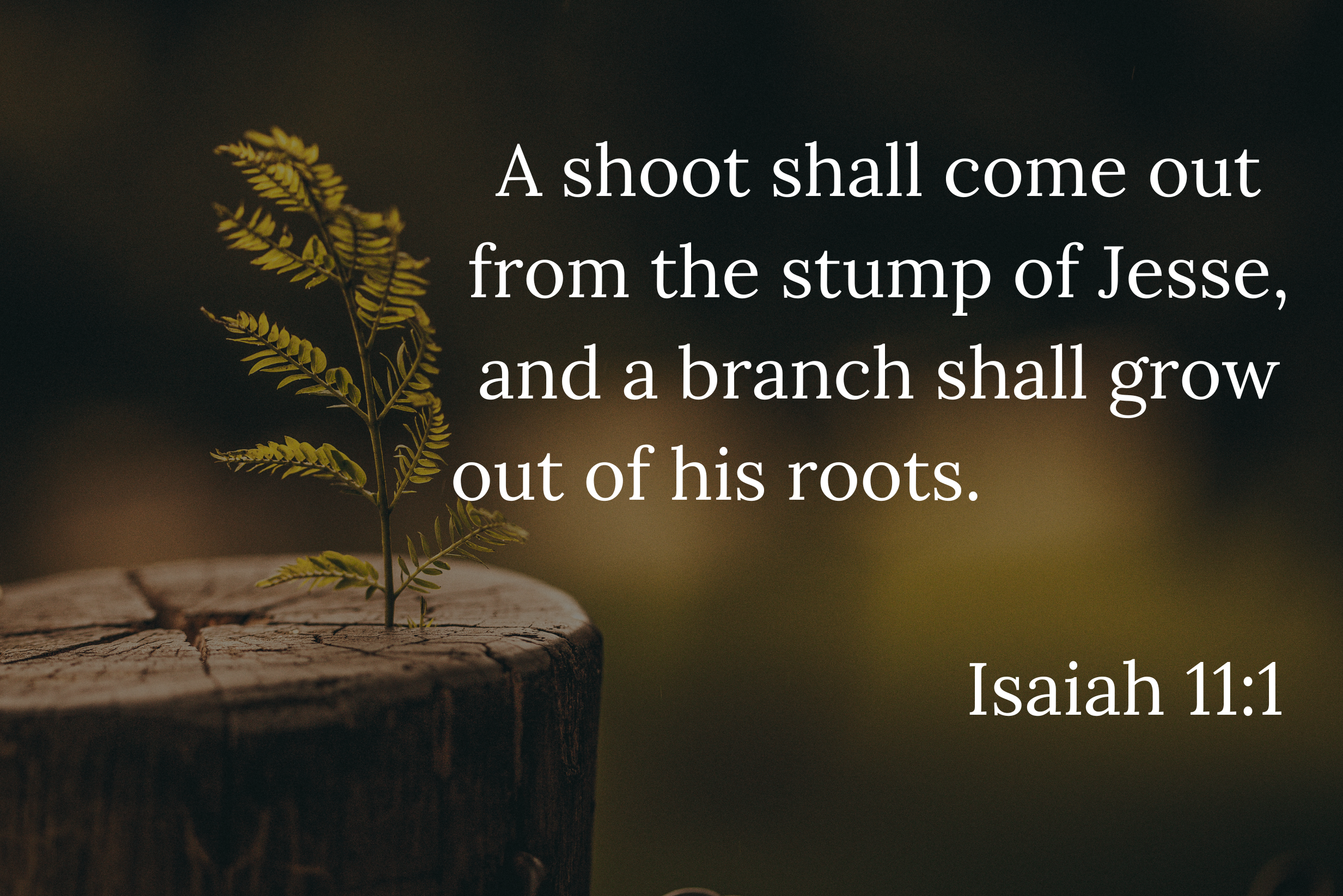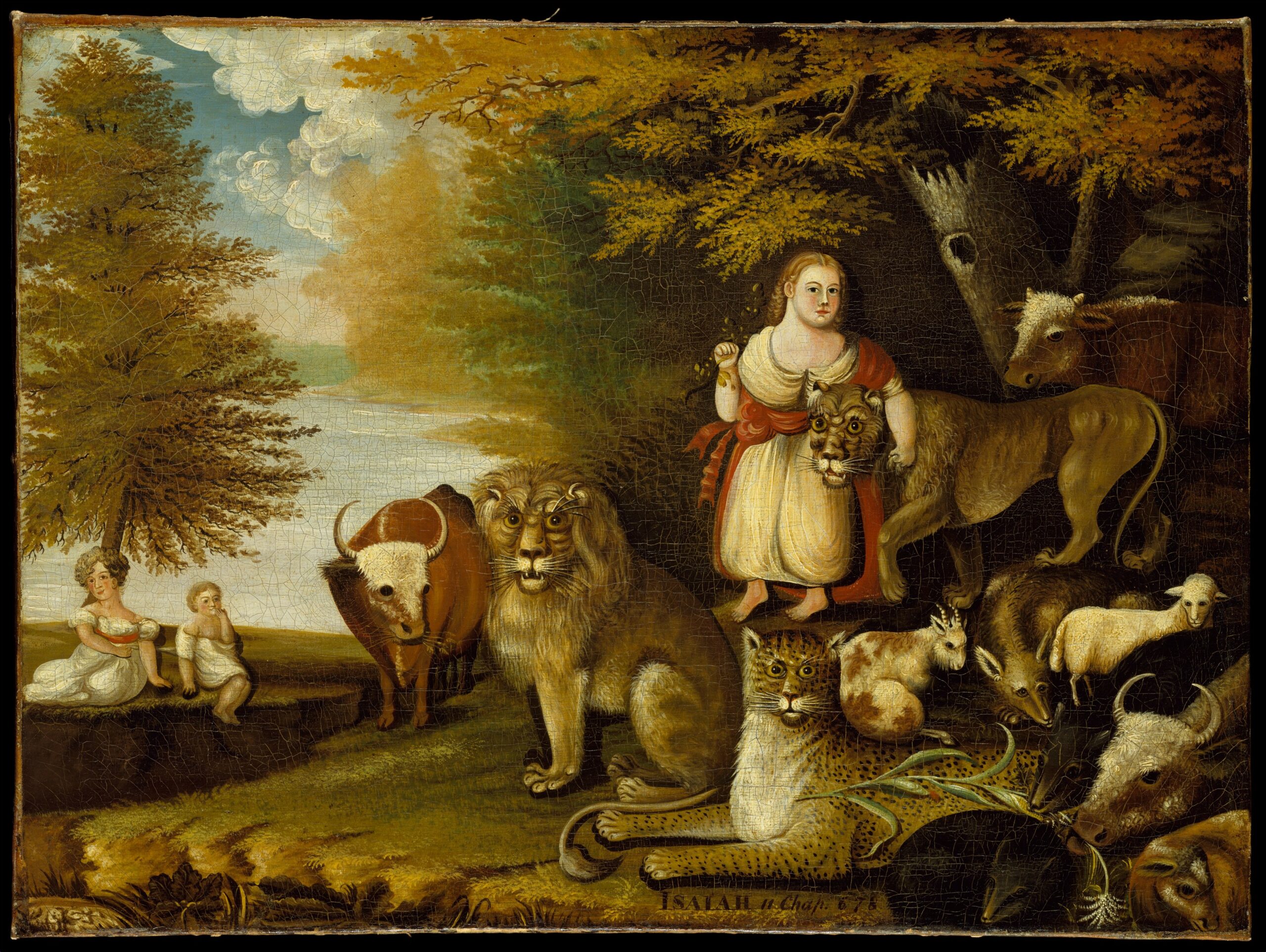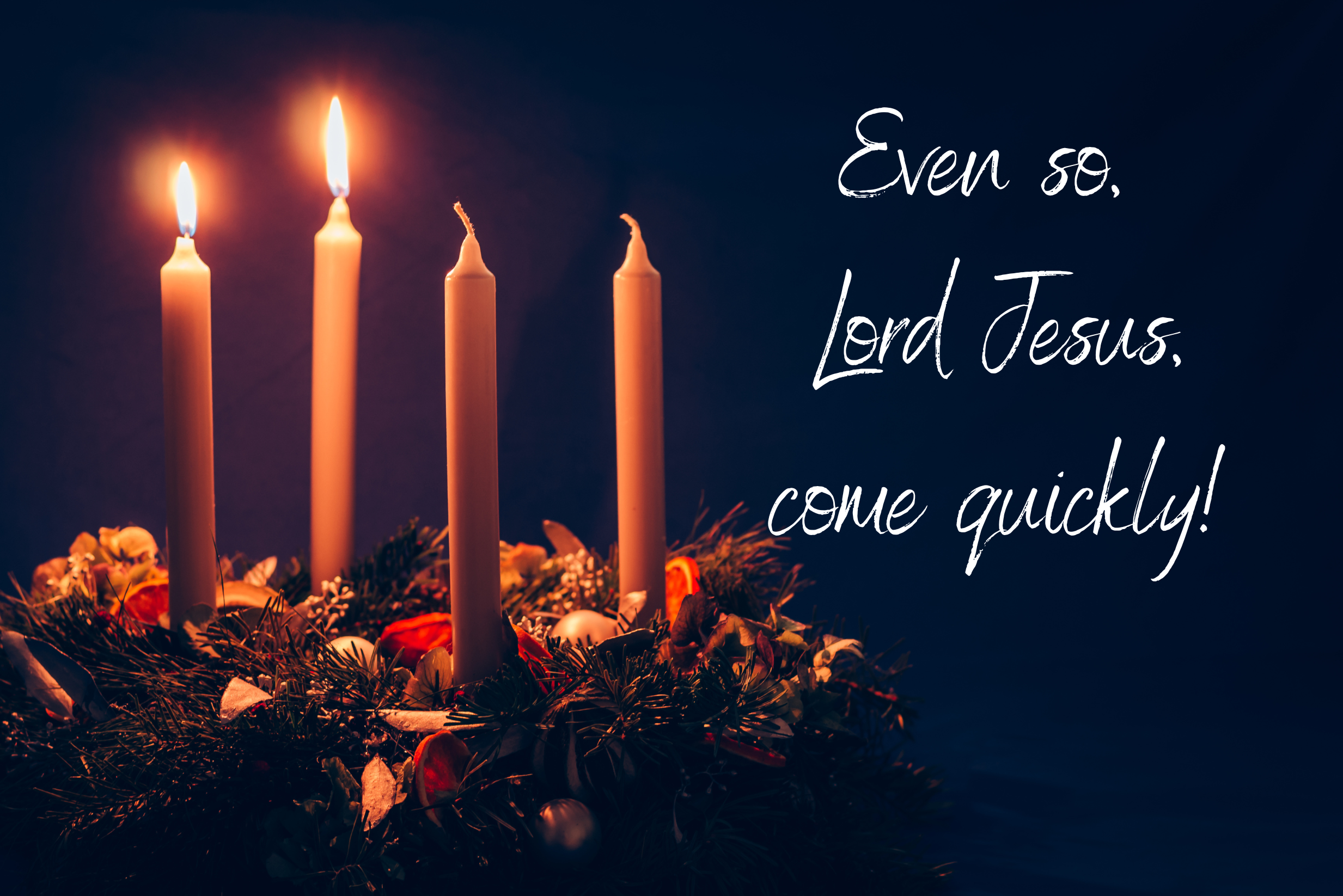Second Sunday of Advent
THE PEACEABLE KINGDOM, IN PIECES
Isaiah 11:1-10
Second Sunday of Advent
Analysis by Matthew DeLoera
1 A shoot shall come out from the stump of Jesse,
and a branch shall grow out of his roots.
2 The spirit of the Lord shall rest on him,
the spirit of wisdom and understanding,
the spirit of counsel and might,
the spirit of knowledge and the fear of the Lord.
3 His delight shall be in the fear of the Lord.
He shall not judge by what his eyes see,
or decide by what his ears hear;
4 but with righteousness he shall judge the poor,
and decide with equity for the meek of the earth;
he shall strike the earth with the rod of his mouth,
and with the breath of his lips he shall kill the wicked.
5 Righteousness shall be the belt around his waist,
and faithfulness the belt around his loins.
6 The wolf shall live with the lamb,
the leopard shall lie down with the kid,
the calf and the lion and the fatling together,
and a little child shall lead them.
7 The cow and the bear shall graze,
their young shall lie down together;
and the lion shall eat straw like the ox.
8. The nursing child shall play over the hole of the asp,
and the weaned child shall put its hand on the adder’s den.
9 They will not hurt or destroy
on all my holy mountain;
for the earth will be full of the knowledge of the Lord
as the waters cover the sea.
10 On that day the root of Jesse shall stand as a signal to the peoples; the nations shall inquire of him, and his dwelling shall be glorious.
Author’s Note: Context is important for this passage. Judah is caught in a crisis of diplomacy and military conflict. The kingdoms of Aram and Israel have been conquered by Assyria. Deciding to rebel and secede, they attempt to force Judah to join them, by invading to depose King Ahaz, a descendent of David (Isa. 7:1 & 2 Kgs. 16:5-9). Ahaz is terrified, but Isaiah delivers God’s promise of protection: “Take heed, be quiet, do not fear, and do not let your heart be faint because of these two smoldering stumps of firebrands” (Isa. 7:4). Isaiah even gives God’s offer of a sign to embolden Ahaz: “Ask a sign of the LORD your God; let it be deep as Sheol or high as heaven” (Isa. 7:11). Yet, Ahaz remains unconvinced, “I will not ask, and I will not put the Lord to the test” (Isa. 7:12). So, he begs Assyria, everyone’s enemy, for protection from Aram and Israel. God then responds to Ahaz’s abject faithlessness by determining that Assyria should swarm and possess Judea. “On that day, the Lord will whistle for the fly that is at the sources of the streams of Egypt, and for the bee that is in the land of Assyria” (Isa. 7:18). Even so, Ahaz visits the king of Assyria, and is so impressed with Assyrian religious culture and artifacts that he returns to Judea, builds temples for the worship of Assyrian gods, and desecrates the temple (2 Kgs. 16:10-20).
As Isaiah’s vision breaks into our world and God’s promise of justice is granted to the poor and meek of the earth, we see the promised day draw ever closer. Even so, Lord Jesus, come quickly!
DIAGNOSIS: Trusting Ourselves
Step 1: Initial Diagnosis (External Problem): Friend or Foe?
Grounding: The tree of Jesse wasn’t simply compromised by King Ahaz’s deal with Assyria; Ahaz felled the tree and left a “stump” (Isa. 11:1). By offering up himself and all of Judah to Assyria, he sacrificed faith in Yahweh for the sake of “peace” and “protection” from Aram and Israel. That’s not to suggest that Ahaz was Judah’s only bad king. Most failed to do what was right in the eyes of the Lord, writing “oppressive statutes, to turn aside the needy from justice and to rob the poor of my people of their right” (Isa. 10:1-2). In other words, even the “good” ones revealed dramatic character flaws. Of course, we don’t exactly know whether Ahaz was one to oppress the “least of these,” but we do know that the Assyrians (with whom he allied his kingdom) weren’t exactly known for compassion or charity.
Tracking: Just a few weeks ago, many of us in the United States voted in midterm elections. Many factors made this election cycle particularly notable. Particularly, campaign ads repeatedly emphasized that our freedoms have become significantly imperiled, between the defeat of Roe vs. Wade and sweeping anti-abortion legislation, threats to LGBTQ and racial justice, threats to social security, election integrity, gun rights, and much more. With heavy and foreboding tones, these ads also asserted which candidates stood with or against us, with a fair amount of demonization to assure us who would surely protect us from our “clear” enemies.
Step 2: Advanced Diagnosis (Internal Problem): Surrounded by Foes
Grounding: “When the house of David heard that Aram had allied itself with Ephraim, the heart of Ahaz and the heart of his people shook as the trees of the forest shake before the wind” (Isa. 7:2). Ahaz is beside himself, judging “by what his eyes see” and deciding “by what his ears hear”—that is, that Aram and Israel have allied against him and are invading. This so terrifies him that he does the unimaginable and begs Assyria for help, despite what “the spirit of wisdom and understanding” might say. What would otherwise have been absurd now seems reasonable.
Tracking: As with Ahaz, our hearts absorb what we see and hear. Our political media machine, fueled by special interest groups with staggering amounts of money to burn, gets at us in one way or another to prey upon our urgent yearning for “peace” and “protection” from the “wolves” and “lions” of this world. Our biases are stirred by conspiracy theories and scapegoating, authored by those who speak without wisdom, understanding, or knowledge. We like to think that we are impervious to this persuasion, but it’s surprising how these claims start sounding reasonable. For example, what if the poor and meek of the earth really are just taking advantage of the system and not wanting to work, as some Christians seem to suggest? (Google “christians preaching against welfare” and observe.) It appears we live in a world filled with predators.
Step 3: Final Diagnosis (Eternal Problem): Dead
Grounding: Isaiah gives Ahaz the Lord’s gracious promise that conquest by Aram and Israel “shall not stand, and it shall not come to pass” (Isa. 7:7), but this is prophecy is lost on Ahaz. Lacking faith, he throws a desperate Hail Mary pass for self-preservation, but Assyria “oppressed him instead of strengthening him” (2 Chr. 28:20). He then shutters the temple of the Lord and sacrifices to the gods of Damascus for favor, thinking they are the secret to Assyria’s success, “but they were the ruin of him, and of all Israel” (2 Chr. 28:23). Spiraling in desperation, “in every city of Judah he made high places to make offerings to other gods,” but to no avail (2 Chr. 28:25). Finally, he dies and is buried in Jerusalem, but “they did not bring him into the tombs of the kings of Israel” (2 Chr. 28:26-27). His son Hezekiah immediately sets to erasing Ahaz’s mistakes, beginning with the shuttered temple.
Tracking: When we feel surrounded by predators, can we afford to trust anyone but ourselves? We rely upon our own wisdom for “practical” solutions to affliction, having been taught our whole lives that God helps those who help themselves (google “Hezekiah 6:1,” a passage you won’t find in your Bible). God’s promises seem too far-fetched—the height of magical thinking. After all, it’s absurd to imagine the wolf living with the lamb and the leopard lying down with the kid. Nature doesn’t work that way. Carnivores would starve and die. In other words, it is naive to think such reckless redemption could ever be possible in a world like this. So, we abandon God’s promises. Left to our predator-prey world, someone will die.
PROGNOSIS: Trusting Jesus
Step 4: Initial Prognosis (Eternal Solution): Raised to Life
Grounding: Nevertheless, Isaiah prophesies that “a shoot shall come out from the stump of Jesse” (Isa. 11:1). Despite Judea’s history, and the fact that Isaiah might be realizing that he will not see his prophecy fulfilled, he insists that there will be one on whom “the spirit of the Lord shall rest” (Isa. 11:2). This will be a leader unlike any other, who will “strike the earth with the rod of his mouth, and with the breath of his lips he shall kill the wicked” (Isa. 11:4). Later, the apostles will testify that this shoot is Jesus, the descendent of David and Ahaz (Matt. 1:6, 9), born in a lowly manger, literally “a child to lead them” (Isa. 11:6). Jesus will likewise testify to himself upon reading the Isaiah scroll: “The Spirit of the Lord is upon me, because he has anointed me to bring good news to the poor” (Luke 4:18). Though Jesus will be crucified and killed by the predators of his world, he will also be raised, that he might give us his own righteousness (“the belt around his waist”), and faithfulness (“the belt around his loins,” Isa. 11:5). This is just as St. Paul testifies: a righteousness that comes not from the law, but through faith in Christ (Phil 3:9), which is not his own doing, but what Jesus does to and for him.
Crossing: Likewise, Jesus comes and raises us to life us by his body and blood, by the waters of our baptism, and by his word of forgiveness which kills and raises—a word not just heard but burned into our hearts.
Step 5: Advanced Prognosis (Internal Solution): Hope for Foes Transformed
Grounding: Isaiah prophesies that “the nursing child shall play over the hole of the asp, and the weaned child shall put its hand on the adder’s den” (Isa. 11:8). The one who is coming will inaugurate the peaceable kingdom, which is the consummation of God’s reign in this world. Here, there is no fear of danger or predation; the impossible is made possible.
Crossing: Because Jesus’ forgiveness brings us to repentance, we experience ourselves as a new creation, transformed by his radical love. This gives us a profound sense of peace, knowing that nothing can separate us from God. At the same time, we consider that if God can transform folks like us, then God can certainly transform the wolves and lions of this old world. This is the kind of hope that makes us eager to witness the power of God manifest in the least likely people among us, so we’re not dissuaded by what we see or hear. Of course, this doesn’t mean that we don’t still feel trepidation, but we know that Jesus holds us all the same.
Step 6: Final Prognosis (External Solution): Come Quickly, Lord Jesus!
Grounding: Isaiah prophesies, “They will not hurt or destroy on all my holy mountain; for the earth will be full of the knowledge of the Lord as the waters cover the sea” (Isa. 11:9). Because the one who is coming will judge the poor with righteousness and decide with equity for the meek of the earth (Isa. 11:4), there will be no more predators competing for what little there is to go around, or fighting to prevail. All will enjoy God’s abundance, because they will all know from whom it comes.
Crossing: Isaiah didn’t live to see this prophecy fulfilled, and we probably won’t either. But Jesus did proclaim, “The time is fulfilled, and the kingdom of God has come near” (Mk. 1:15). We know the work of justice is never done, and the fear of the Lord gives urgency to our call. Yet, we witness the peaceable kingdom in part: As Isaiah’s vision breaks into our world and God’s promise of justice is granted to the poor and meek of the earth, we see the promised day draw ever closer. Even so, Lord Jesus, come quickly!


